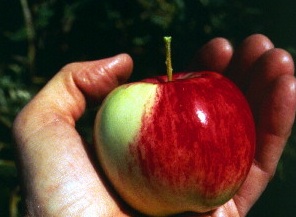
Features
Production
Research
McIntosh still the most popular apple in Canada
September 22, 2009 By The Canadian Press
 September
September
22, 2009 – The rosy red McIntosh apple, discovered by Scottish settler John
McIntosh in 1811 while clearing land on his farm in eastern Ontario, is one
heritage apple that thankfully has survived.
September
22, 2009 – The rosy red McIntosh apple, discovered by Scottish settler John
McIntosh in 1811 while clearing land on his farm in eastern Ontario, is one
heritage apple that thankfully has survived.
In
fact, it is the most popular apple in Canada with the largest production, says
Adrian Huisman, an adviser on the fruit for the Ontario Apple Growers based in
St. Catharines, Ont.
 |
|
“It
represents about 25 per cent of the total production in Ontario, Quebec, Nova
Scotia and British Columbia,” he says.
Other
heritage apples like St. Lawrence, Snow and Golden Russet haven’t fared as
well, although interest is growing among foodies to have the varieties revived
for niche markets.
“The
reason that most heritage apples went out of production is that no one was
buying them,” says Huisman. “Now the odd consumer says, ‘I used to like those.
I ate them as kid.’”
He
says that Ontario produces almost three million bushels of the McIntosh variety
while British Columbia weighs in with 500,000 bushels, a lot of “which go to
processing apple juice but mainly they are used for the fresh market.”
Brian
Gilroy, an apple grower in Meaford, Ont., and chairman of the Ontario Apple
Growers board, says this year’s crop of apples in general has been very good.
“I
put it down to lots of rain, which means the fruit size is large and extra
large,” he says. “Two fairly new varieties, Honey Crisp and Ambrosia, are also
selling well.”
Canadian
growers are aware of Michigan state’s huge crop which means their apple
processing prices have dropped by 50 per cent this year “and that has a huge
effect on our market,” says Gilroy.
Consequently
a lot of Canadian processors have to buy U.S. apples to turn into applesauce,
which is then shipped back to the U.S.
“We
are OK with that. It’s just when they artificially deflate the price so far
below our cost of production, it’s worrying.”
Print this page